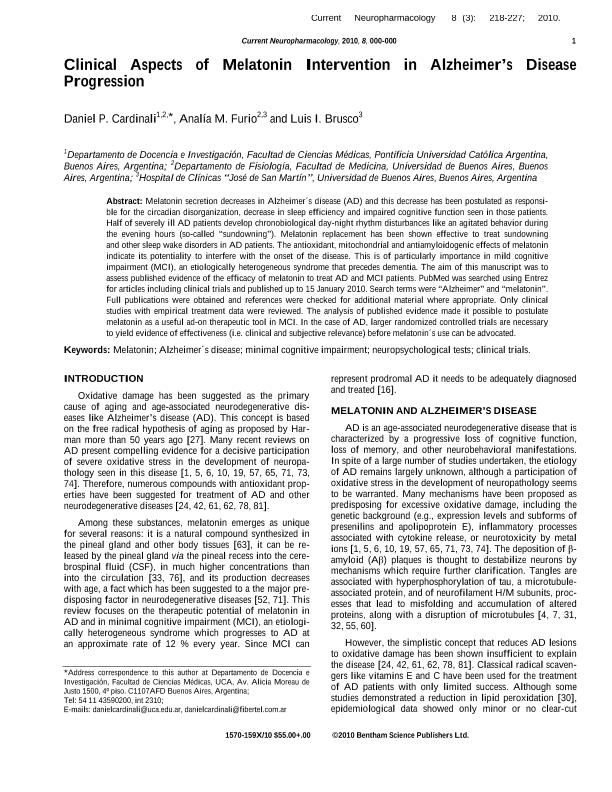Mostrar el registro sencillo del ítem
dc.contributor.author
Cardinali, Daniel Pedro

dc.contributor.author
Furio, Analía Mabel

dc.contributor.author
Brusco, Luis Ignacio

dc.date.available
2023-03-14T13:55:45Z
dc.date.issued
2010-09
dc.identifier.citation
Cardinali, Daniel Pedro; Furio, Analía Mabel; Brusco, Luis Ignacio; Clinical aspects of melatonin intervention in Alzheimer’s disease progression; Bentham Science Publishers; Current Neuropharmacology; 8; 3; 9-2010; 218-227
dc.identifier.issn
1570-159X
dc.identifier.uri
http://hdl.handle.net/11336/190477
dc.description.abstract
Melatonin secretion decreases in Alzheimer´s disease (AD) and this decrease has been postulated as responsible for the circadian disorganization, decrease in sleep efficiency and impaired cognitive function seen in those patients. Half of severely ill AD patients develop chronobiological day-night rhythm disturbances like an agitated behavior during the evening hours (so-called “sundowning”). Melatonin replacement has been shown effective to treat sundowning and other sleep wake disorders in AD patients. The antioxidant, mitochondrial and antiamyloidogenic effects of melatonin indicate its potentiality to interfere with the onset of the disease. This is of particularly importance in mild cognitive impairment (MCI), an etiologically heterogeneous syndrome that precedes dementia. The aim of this manuscript was to assess published evidence of the efficacy of melatonin to treat AD and MCI patients. PubMed was searched using Entrez for articles including clinical trials and published up to 15 January 2010. Search terms were “Alzheimer” and “melatonin”. Full publications were obtained and references were checked for additional material where appropriate. Only clinical studies with empirical treatment data were reviewed. The analysis of published evidence made it possible to postulate melatonin as a useful ad-on therapeutic tool in MCI. In the case of AD, larger randomized controlled trials are necessary to yield evidence of effectiveness (i.e. clinical and subjective relevance) before melatonin´s use can be advocated.
dc.format
application/pdf
dc.language.iso
eng
dc.publisher
Bentham Science Publishers

dc.rights
info:eu-repo/semantics/openAccess
dc.rights.uri
https://creativecommons.org/licenses/by-nc-sa/2.5/ar/
dc.subject
ALZHEIMER'S DISEASE
dc.subject
CLINICAL TRIALS
dc.subject
MELATONIN
dc.subject
MINIMAL COGNITIVE IMPAIRMENT
dc.subject
NEUROPSYCHOLOGICAL TESTS
dc.subject.classification
Fisiología

dc.subject.classification
Medicina Básica

dc.subject.classification
CIENCIAS MÉDICAS Y DE LA SALUD

dc.title
Clinical aspects of melatonin intervention in Alzheimer’s disease progression
dc.type
info:eu-repo/semantics/article
dc.type
info:ar-repo/semantics/artículo
dc.type
info:eu-repo/semantics/publishedVersion
dc.date.updated
2023-03-12T15:43:02Z
dc.identifier.eissn
1875-6190
dc.journal.volume
8
dc.journal.number
3
dc.journal.pagination
218-227
dc.journal.pais
Estados Unidos

dc.journal.ciudad
Oak Park
dc.description.fil
Fil: Cardinali, Daniel Pedro. Consejo Nacional de Investigaciones Científicas y Técnicas; Argentina. Pontificia Universidad Católica Argentina "Santa María de los Buenos Aires". Facultad de Ciencias Médicas. Departamento de Docencia e Investigación; Argentina. Universidad de Buenos Aires. Facultad de Medicina; Argentina
dc.description.fil
Fil: Furio, Analía Mabel. Universidad de Buenos Aires. Facultad de Medicina. Hospital de Clínicas General San Martín; Argentina
dc.description.fil
Fil: Brusco, Luis Ignacio. Universidad de Buenos Aires. Facultad de Medicina. Hospital de Clínicas General San Martín; Argentina. Consejo Nacional de Investigaciones Científicas y Técnicas; Argentina
dc.journal.title
Current Neuropharmacology

dc.relation.alternativeid
info:eu-repo/semantics/altIdentifier/url/https://benthamscience.com/article/17262
dc.relation.alternativeid
info:eu-repo/semantics/altIdentifier/doi/http://dx.doi.org/10.2174/157015910792246209
Archivos asociados
